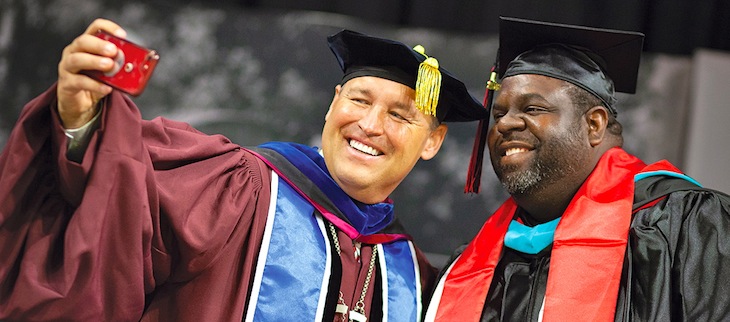ASU’s growing online degree program for those ‘motivated to graduate’
by August 20, 2018 5:30 pm 1,108 views

Arkansas State University Chancellor Dr. Kelly Damphousse snaps a selfie with Nathaniel Charles Todd during May commencement.
As Nathaniel Charles Todd stepped on the stage to receive a diploma at Arkansas State University’s spring commencement ceremony, he and the university recorded milestones. Todd was recognized as ASU’s 90,000th graduate.
Todd, of Okmulgee, Okla., received his master’s degree in college student personnel services while his wife, Marcia, a board member for a Tulsa nonprofit, received her master’s degree in public administration from ASU.
The May 12 commencement ceremony marked the first time that Todd, director of prospective student services at Oklahoma State University Institute of Technology, had stepped foot on the ASU campus. Nathaniel and Marcia earned their master’s degrees entirely through online instruction from ASU.
The Todds represent a growing number of ASU students choosing to pursue degrees completely online. For the spring semester, ASU had more than 4,800 online-only students, the largest number of online-only degree-seeking enrollees of any Arkansas university, said Dr. Thilla Sivakumaran, ASU’s executive director for global initiatives, who supervises the online program. ASU has awarded some 2,800 online-only degrees since the institution began offering online courses in 2008, he said.
More than half of the 4,800 students pursuing online degrees live outside Arkansas, Sivakumaran said. Nathaniel Todd noted that while he was earning his master’s degree, he was in classes with students from across the United States and Canada. Sivakumaran said students from 40 states, including Alaska and Hawaii, are enrolled in online courses.
While online enrollment is growing, the university doesn’t see that growth pulling traditional first-time college students away from the campus, he said. The average age of an undergraduate online-only student is 31, and the average age of a master’s degree online student is 34, Sivakumaran noted. “These are adult learners.”
The online program doesn’t seek students with no previous college nor does it market its classes to traditional first-time students, he said.
“We don’t recruit high school students [for online courses],” he said. “We want them to come to campus.”
Students for whom the online-only model is attractive include those who started at another institution but didn’t complete a degree or who are seeking an advanced degree, Sivakumaran said. Many online students are place-bound because they must work to support their families, don’t want to leave their communities to move to a college campus, don’t have the time to make the commute between campus and home, or for other reasons simply cannot make an on-campus schedule of classes work for them, he said.
“These are students who weren’t going to come onto campus,” Sivakumaran said.
More than 1,500 online students are enrolled in teacher education courses, he said, with more than 300 pursuing a master’s degree in reading. In addition to a number of teacher education degree programs, ASU’s offering of more than 30 online degrees includes public administration, applied science, engineering management, sports management general studies, business administration, creative media and others. Sivakumaran said the university plans to add eight more programs in the fall of 2018 and spring of 2019.
While ASU has provided online instruction for a decade, Sivakumaran said “there are so many in the marketplace now.” ASU has experienced growth in its online programs not just because it has been in the business longer than some other institutions, but also because “we’re a bricks-and-mortar institution. People want to identify with that brand. … We’re affordable as an institution with good-quality, highly ranked programs.”
Online students pay the same tuition as on-campus students but are not required to pay certain fees, he noted.
“Our goal is provide services to needs. The degree is the same, the admission criteria are the same, [online students] have the same instructors and the same classes” as those enrolled in ASU’s on-campus courses. “It’s not a correspondence course. None of our online courses are correspondence courses,” he said, adding that a common misconception is online classes are less difficult than on-campus classes, but that is not the case. “There is more onus on you [in an online class] than in a classroom. It’s not easy. You still have to do the work. The faculty determines the quality of the program. The students bring a wealth of experience” to the virtual classroom.
Marcia Todd noted that while earning her online degree, she enjoyed easy access to her instructors and was able to interact with other students outside class through Skype, video chats and Google Hangouts. The online program fit her family’s educational needs because she and her husband had different assignment deadlines, which permitted them to alternate completing class work and taking care of their children.
There are a number of reasons why going back to school virtually is attractive, Sivakumaran said. While the 18-year-old, on-campus student enjoys the college experience that includes football games, concerts and social events, that is not the case for the more mature, online student. For some online students, he said, completing a degree “may be a lifelong dream.”
For example, one 68-year-old military veteran who had his college career interrupted for 40 years went back to school online in order to earn a degree before his son, and he managed to accomplish that feat.
For most online students, however, Sivakumaran said career advancement is what drives their quest for finishing a four-year degree or pursuing a graduate degree.
“These students are motivated to graduate because there’s something at the end of it — a promotion or a salary increase,” Sivakumaran said. “I look at it as providing them an opportunity they may or may not have had [in the past]. They’re not so much worried about campus life. They’re concerned about their life.”
